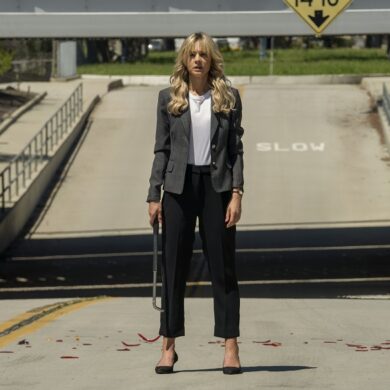Superhero movies or movies about people with special powers seem all the rage. Or so people will say. In actuality they have been for sometime now. Take a look at the box office, or even some VOD receipts, and this point is obvious. So what happens when a film comes along that tries to buck the trend? In the case of Fast Color, it means a noble effort that deserves to be championed and held up high. Even if it takes a bit too long to fully gel.
In an unspecified future, where the world has been ravaged by doubt, a woman with unexplained and unchecked abilities, runs from the law. Living in run down motels for as long as possible, Ruth knows anyone she comes into contact with, is in danger. Both from those looking for her and herself. Making her way across the country, she feels compelled to return home. A place she can barely stand to look at, from a mile away. Though, after a chance encounter with a stranger, which isn’t just dumb luck, she has no where else to turn.
Gugu Mbatha-Raw turns in a quite, but powerful performance as the troubled Ruth. Her past is filled in slowly over time, yet never really matters. Her actions and movements speak for themselves. She feels guilt over the damaged she caused, rather than being damaged herself. It’s a fine line to walk and the careful measure with with Raw chooses each of her actions. On both sides she’s supported by terrific turns from Lorraine Toussaint and Saniyya Sidney . This is where the heart of the film lies, in these moments when each of the three women interact. It’s enough to make most people forget about the story, which feels uneventful, even though it carries a strong message.
The main problem Fast Color has, is that of pacing. So much of the story seems to linger on beats of no consequence, before unfurling huge exposition dumps that are then barely explored. A case where the bits that show, rather than tell, stand out the best. At a couple different times a main character is literally seen reading from a book (to themselves, but out loud) the history of their family and the emergence of their powers. Trimming away these pieces would go a long way to tightening up the elements that hold it back from being truly amazing. At the same time there’s the sense that this mythology building would be something to pay off in a sequel, if the film had such audacious goals. Were that to happen, it would be a movie this reviewer would gladly check out.
While the family dynamic unfolds at a languid and also laborious pace, the world building sings. Signs litter every store, bathroom, roadway to the state of things. Water not only is in short supply, but the very things that go along with water. Grocery stores are barren wastelands, seemingly as if riots brake out daily. Citizens fondly remember fresh brewed coffee, while lamenting instant packets, which themselves cost an arm and a leg. There may not be zombies about, yet the desolate town seems ripe for the kind of setting. Society does shamble along on. For how much longer though, is anyone’s guess.
It may seem weird to say that a movie, which at times is just ok, is worth seeing, championing and becoming an inspiration, but that should hopefully be Fast Color‘s lasting impression. There is so much passion put into the film, from the directing, to the cinematography and of course the standout performances. While it’s the kind of picture that gets lost in itself for too long, there’s no denying the joy that comes from watching women with powers (and of color) get a movie in which they aren’t confined by studio constrains. More directors and writers should attempt such projects. It never wants to move at the same beat as it’s bretheren, content by the rhythm of it’s own internal drum. If that’s something people can’t get behind, then maybe everyone should stop making movies altogether.



